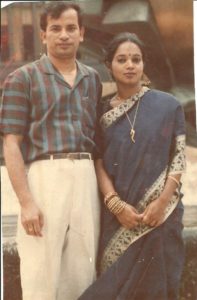An American Dream, Exported from Bangladesh, Made in the Bronx
 •
•
Amu (which is what I call my mother) feared being asked for a Minnie or Mickey Mouse t-shirt. She dreaded being asked this because she could not differentiate between the two. When tourists walked into the store where she worked, she would pray that they ask for a Statue-of-Liberty or “I Love New York” t-shirt instead. Then, after retrieving their preferred shirt, she would return to folding clothing, relaxing once more.
Upon learning this decades later, I poked fun at Amu for not knowing the difference between Minnie and Mickey. One wears a hair bow; the other doesn’t. But adapting to America did not come easily to my mother. Bangladesh, her homeland, was not as Westernized then as it is today.
Her diffidence about her place in America ensnared Amu in a social bubble, comprised only of other Bangladeshis. Her odd jobs left her in a financial rut. That rut trapped Amu even when she found stable work as a teaching assistant at a New York City public school, where she made $18,000 per year.
With most of the money going towards rent, my parents had little left for other basic needs, like food.
Amu took my older brother and me grocery shopping at a place called Dairy King—not Dairy Queen. It no longer exists in the same place. But it was in Castle Hill, a neighborhood in the South Bronx. At Dairy King, we filled the metal shopping cart with Twinkies, glazed donuts, and Little Debbie Strawberry Shortcake Rolls. They were cheap and filling. My father also occasionally treated us to eggs and buttery biscuits at Roy Rogers. That Roy Rogers also no longer exists. It was in Parkchester, in the southeast Bronx, where my parents raised my brother and me.
Over time, I discovered another Bronx neighborhood: Morris Park. That’s where Mercy College’s Bronx campus was. To keep her teaching assistantship, Amu enrolled part-time at Mercy. She would finish work at 3:30 p.m. Next, Amu’s friend would drive her, my brother, and me home, since we did not have a car. Amu would change our clothing, feed us Maruchan Ramen Noodle Soup, help us with our homework, bathe us, and then head to Mercy. She would be there from 8:00 to 10:30 p.m. Four years after she began coursework in the U.S., she received her bachelor’s degree, having transferred some credits from her studies in Bangladesh.
Pat did not let Amu stop there, however. Pat has black hair, is about five feet tall, and smiles often. She is Amu’s good friend, and she served as an occupational therapist in the grey-bricked school where Amu worked. Pat encouraged Amu to pursue a master’s degree in occupational therapy. But the idea of assuming more educational loans scared Amu. Regardless, Pat persisted with her encouragement. In 2002, Amu began her master’s program at Mercy College.
Thick heavy textbooks, highlighters, and blue and red pens scattered the dining table. In spite of how much she read, she stressed about writing. Punctuation and conjugations befuddled her. Typing gave her white hairs.
One night, when I was thirteen, my mother had a paper due. She handwrote the entire paper on a yellow notepad, but she needed help typing it. My father, brother, and I would often take turns helping her type. But that night, none of us were available. That night, Amu’s stress peaked. She broke. She ran straight for the kitchen, opened the cabinets beneath the kitchen sink, and snatched a yellow, 99-cent chemical cleaner. Then, she attempted to drink the cleaner. I ran to her and grabbed it from her hand. She sat there on the kitchen floor, sobbing. That night, my father, brother, and I put aside our work to help her type.
If that was the lowest point of her education, the acme arrived not too long later. It was nighttime. We were hosting a gathering in our home. In the middle of the party, Amu noticed a big envelope within a pile of envelopes on the dining table. She tucked it underneath a black-and-brown rug in our living room. My dad noticed. When Amu wasn’t looking, he lifted the rug, took the envelope, and opened it. Minutes later, he announced to everyone that Amu passed the occupational therapy license exam. Amu broke down crying on the same spot on the kitchen floor. A week later, she became an occupational therapist.
For the first time, her American Dream felt possible.
Often, we go through life thinking our successes are largely due to our own effort and talent. We fail to acknowledge the scaffolding our caretakers may have built for us and that has enabled us to excel as far as we have. Recognizing the extent of our privileges or the role our caretakers have played in where we are today can crush our self-esteem. We want to think we’ve accomplished what we’ve accomplished on our own. Yet, when we gain a clearer view of the constellation of factors that have allowed us to shine, we connect with those less lucky than we are with more compassion. By exercising greater compassion, we become fuller human beings.
Every now and then, I tease Amu for her Minnie-and-Mickey troubles. But beneath the banter, I realize that so much of my fortune is due to her sacrifices.









